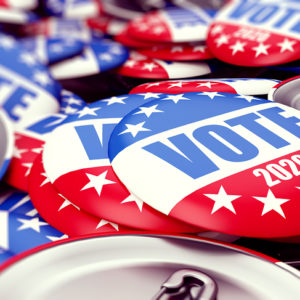Tired of all the political ads and ready for the 2020 presidential voting to start? It already has — in Minnesota.
Early and absentee voting has begun in several states — including Minnesota, North Carolina and Virginia — raising the question as to whether the New Hampshire primary is still considered the First in the Nation. Minnesota and North Carolina media are both declaring their early voting starts presidential primary contests.
Since 1972, Iowa has held the first presidential nominating contest. This year the Iowa caucuses will be held on February 3, followed by New Hampshire’s #FITN primary (as locals call it) eight days later, as mandated by state law.
But in Minnesota, absentee voting and early voting began Friday, with public radio station MPR proclaiming: “Minnesota ushers in a full-fledged presidential primary.”
The presidential primary — to be held on “Super Tuesday” — will be Minnesota’s first since 1992 and only the fifth in state history, following years of holding presidential caucuses. After frustration expressed by Minnesota voters over the 2016 caucuses, lawmakers returned the state to a primary election process.
Minnesota Democrats will have 15 candidates to choose from. The Minnesota Supreme Court recently rejected a GOP challenge to list only President Trump on the ballot, and Republican voters can now write in candidates of their choice.
“This is really an unknown for us,” said Ken Martin, the state’s Democratic chairman. “This is the first time we’ve had a presidential primary in Minnesota for close to 30 years. It’s hard to know precisely what to expect.”
With that in mind, Minnesota Sen. Amy Klobuchar is holding campaign events around her home state. Meanwhile, the ultra-progressive and often controversial Rep. Ilhan Omar (D-Minn.), will campaign for Sen. Bernie Sanders (I-Vt.), according to NBC News.
And it’s not just the Gopher State. In North Carolina, mail-in ballots are already available for absentee voting. “The 2020 primary elections have begun in North Carolina,” The Charlotte Observer declared.
That primary also includes Republicans. President Trump will face two primary challengers in North Carolina — former Massachusetts Gov. Bill Weld and former Illinois U.S. Rep. Joe Walsh — after the state elections board also overrode Republican efforts to have the president’s name the only one on the ballot.
In Virginia, in-person absentee voting began last Thursday, according to the state Department of Elections. Registered voters can receive an absentee ballot in the mail by request online. Voters can also find the ballot online and mail it to their local voter registration office.
Republicans in Virginia will choose delegates to their national convention at a state convention, and no GOP candidates will appear on the ballot in the presidential primary.
Meanwhile in California — with 495 delegates, more than any other state — Democrats moved their primary from early June to the Super Tuesday contest March 3, when a total of 14 states will hold their contests.
As a result of that calendar change, California voters will begin casting their mail-in ballots on February 3 — the same day as the Iowa caucuses. In the 2018 midterms, 65 percent of Californians voted via early ballots.
New Hampshire Secretary of State Bill Gardner, widely viewed as the guardian of the Granite State’s First in the Nation, dismissed concerns that early voting undermines their place in the presidential election process. “It doesn’t affect us,” he said at a November press event formally announcing the date of the primary.
“Because of the nature of this state and how many elections we’ve had, candidates do things that last week or that last weekend that show the people of New Hampshire what they’re made of, their character, that crystallizes in their minds why they thought they were going to vote for this person,” Gardner said.
A complete list of primaries, caucuses and their dates is available here.

